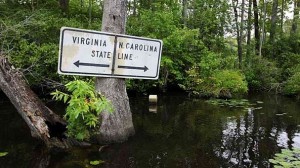The Virginia Department of Transportation has spent $192 million on design and other work on the U.S. 460 Connector but the U.S. Army Corps of Engineers has yet to give a permit for the project, which would destroy an estimated 480 acres of wetlands.
VDOT officials quoted by the Virginian-Pilot‘s Dave Foster say work is proceeding on portions of the project not affecting the wetlands because they are confident they have plotted the most practical, least environmentally damaging alternative for the four-lane, limited access tollway. The $1.4 billion toll project, now dubbed the Commonwealth Connector, will provide interstate highway-quality access from Petersburg to Suffolk. The investment of roughly $1 billion in public dollars has been justified on the grounds that the highway will stimulate the Ports of Virginia and port-related industrial development.
But the Army Corps is still studying the environmental impact, and the Southern Environmental Law Center has called upon the Federal Highway Administration (FHWA) to require VDOT’s design-build contractor to halt work until the environmental reviews are complete. The wetlands include pine flats and river swamps that sprout cypress and tupelo trees in the watersheds of the Blackwater and Nottoway rivers. A local environmentalist described them as looking like “dinosaur land.”
VDOT’s latest environmental report concludes that the 480 acres of impacted wetlands far exceeds the 129 acres estimated in the Environmental Impact Statement. That’s an “astonishing” 270% increase, stated SELC attorneys Trip Pollard and Morgan Butler in a letter to FHWA Division Administrator Irene Rico. That amount is three times larger than the estimated impact of the proposed Southeastern Parkway, which the FHWA had terminated on environmental grounds.
“Given the unprecedented magnitude of wetlands impacts now expected to result from the new Route 46o, we believe this proposal warrants serious reconsideration,” stated Pollard and Butler. To ensure that the review is not biased by “any further irretrievable commitment of resources” to the project, FHWA should halt work until the review is complete, they said.
— JAB



